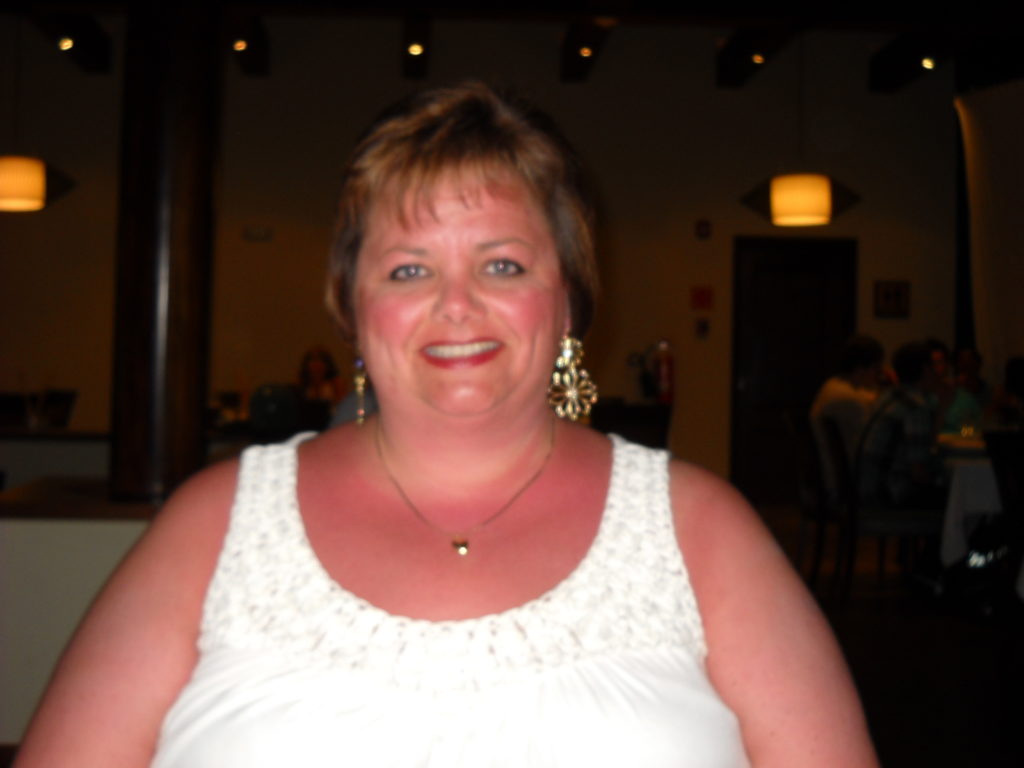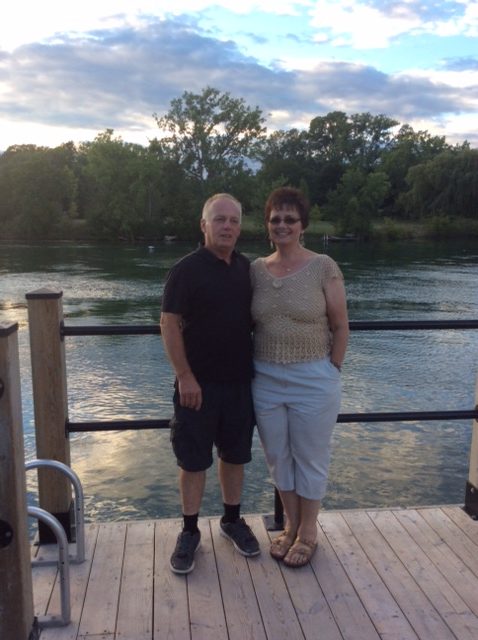FORWARD: Barb G. Begy Lee, a Weight Loss Surgery friend from Canada, has been sharing her, now eight-year, WLS Journey with people from all walks of life. Barb made the following presentation at a bariatric surgery orientation. Read how she weaves the story of what she has learned about living the WLS Lifestyle with her pre-WLS dreams of living free of obesity and serving the less fortunate. Following her presentation Barb answers our questions and gives her best advice to all WLS patients, but especially ‘newbies.’ She presents a good picture of how a successful WLS patient approaches life and uses their tool. And now… Here is Barb Begy Lee.
By: Barb G. Begy Lee
A Servants Heart
Hello. My name is Barb and my Weight Loss Surgery journey started in late 2012. I was seeking my doctor’s advice about dealing with diabetes, nutrition, weight loss, and living a healthy lifestyle. I wanted to learn how to take care of my health – beginning with what I eat. The doctor’s staff handed me a book to read about diabetes. They simply said the best route for me was thru the bariatric clinic, regarding weight loss. I had no idea what that meant. It would take months for me to hear back from them. I asked to be referred to the Wharton Medical Clinic, which specializes in Weight & Diabetes management. I wanted to be educated and proactive while waiting for the bariatric clinic to contact me.
Eventually, I received mail from the bariatric clinic informing me of the process and steps that lead up to weight loss surgery. My reaction was ‘What? I don’t want surgery.’ Fear welled up in me. I was sure I wouldn’t go through with it, but my husband Jim and I decided to go to the bariatric orientation to learn if surgery might be an option to consider. Coming out of orientation I was thinking “No way,” but my husband came out thinking, “This is it!”
The WLS Process
A gastric bypass is a form of weight loss surgery. My surgeon would modify my stomach, which is the size of a football. It would be reduced to the size of a golf ball. This limits the amount of food I can put into my stomach. It limits my calorie intake. The surgeon also takes my small intestine, cuts it, and attaches it to my new small stomach. This creates a situation where most of the old stomach and small intestines are bypassed and not used anymore. With this ‘bypass,’ I would not be able to absorb all the calories and nutrients I consume. Malabsorption is the term for this. If I don’t eat and drink as directed, I could become vitamin and mineral deprived and or dehydrated. It is also possible to develop a hernia and or blood clots.
In escaping obesity I learned that my health issues, diabetes, sleep apnea, GERD, asthma, blood pressure, cholesterol, and arthritis could all disappear. I learned that surgery is not a quick fix weight loss plan. To avoid regaining lost weight and having poor health issues return, I would have to be careful in my dietary choices.
I decided to keep the door open and proceed one step at a time until I knew for sure what I was doing. It was possible to decline weight loss surgery right up to the moment of it happening. Scared, I looked and prayed for clarity in regards to my possibly having this surgery. I had a vision of what my life would look like if I did not have the surgery. I saw health issues worsening and me ending up in a wheelchair.
My Vision
For a long time, I had a passion in my heart to go on a mission trip to India. I wanted to help free young girls from human trafficking. I was looking at a possible trip that coming September. When pondering what life would look like if I had weight loss surgery, I saw myself much healthier, more energetic, and on the mission trip. In my visualization, I was able to get down on my knees to hug these girls. Something I did not have a hope and a prayer of doing at 328 lbs. I came to believe that I was meant to have the surgery. If it was not meant to be, then God would close that door to me.

The day of the surgery, as they pushed me down the hall to the operating room I said to myself, “You can still back out.” However, a real sense of peace had come over me, allowing me to relax and let go. The next thing I knew, they told me the surgery went well, and I thought “I guess it’s too late to back out now!”
Fulfilling my Dream
Since the surgery in January 2014, my non-scale victories included remembering that I had dimples when I smile. They had been hiding for over 25 years. I loved seeing that I actually do have a chin, neck, collar bone, hip bones, and ankles. I can cross my legs easily, and tackle stairs without using the rails.
So when the September trip to India came around, I went on the mission trip. The flight to India was my first in over 25 years that I didn’t need a seat belt extension to fit comfortably in my seat. I was physically active and walked many miles. I was able to meet many women and share hope and encourage them. When I walked up to a group of little girls, I was able to get down on my knees and hug them. My prayers were answered, my dream had come true! None of this would have been possible with my excess weight and health issues.
The Weight Loss Surgery Lifestyle
Diabetic meds are a thing of the past. I have been kicked out of the diabetic clinic and am no longer considered diabetic. I have more energy and my sleep apnea is a thing of the past. My blood pressure and cholesterol are both normal and totally under control. I also was pleasantly surprised to find that I no longer have Asthma. My seasonal allergies are almost non-existent.
I thank God, as having weight loss surgery was the best decision in my life next to Him. Currently, I take only vitamin and mineral supplements.
The hardest part of the weight loss surgery lifestyle isn’t losing the weight, it’s keeping it off.
Bariatric surgery is not a quick fix, it is not the easy way out, and it isn’t foolproof. Like any weight loss method, you have to live by the guidelines for it to be successful long-term. Yes, you will lose weight quickly at first and you won’t be hungry. The hunger will eventually return and it will take much hard work, diligence, and determination.
Weight Loss Surgery Success
I am going to share four critical things you need to do for success when you have weight loss surgery. Number 1: You need to get your protein, fiber, and liquids each day. Number 2: Be sure to get in all your vitamins and minerals. Try to stay within the target range of what has been recommended to you by your dietician. Meet your specific goals for calories and protein. Number 3: Keep a journal of your food to help keep you on target. It is easy to not be aware you have fallen off your regimen. Number 4: Get active with some form of exercise right away. Don’t procrastinate as I did. I kick myself daily for waiting almost a year post-op to get serious about exercise. Your muscles and skin will be saggier when you neglect to exercise.
I want to encourage you if you are connected with the Wharton Medical Clinic to stay connected. Dr. Wharton was an important part of my pre-surgical experience – and post-surgery, he is a wealth of bariatric knowledge and support. He is my ‘Go-To’ when I have questions or concerns. Tap into his wealth of knowledge, information, and extra support!
My Personal Weight Loss Journey
Before going to India, I had lost just over 100 lbs., in India, I lost 10 more. When I returned, I was approaching 10 months post-surgery and my weight loss came to a halt. For a few months, I basically stayed the same. Dr. Wharton advised me I may have reached the limit of my weight loss surgery. Typically you can lose 30% of your body weight and I had already lost 35% of mine. Weighing 215 lbs. frustrated me. I did not have this surgery to remain over 200 lbs. and still be classified as obese. I was not finished yet.

I decided to get more regimented. To get away from doing things ‘my way,’ I journaled in MyFitnessPal. Exercise became more consistent. I took in extra fluids and upped my protein intake. Consistency is important and I hadn’t been consistent, so I leveled it out. I began riding my exercise bike, using my Wii, I even pulled out my old Richard Simmons tapes.
It began to take a toll on my arthritis so I had to slow down a bit. I focused on walking. When I saw my doctor, my added diligence, extra fluids, and increased protein intake had enabled me to lose another few lbs. After much hard work, I am now in what is called Onederland (under 200 lbs.). I am less than 15 lbs. away from being out of the obese classification. I am on my own now meaning weight loss surgery is no longer my helper. Every pound lost now is a sweet victory for me. Today, even a 5 lbs. loss – which I have as my next goal – could take me many months or longer. I will get there and from there I’ll take it one step at a time.

A Life-Long Journey
Once you lose the weight you will learn great, hard, and valuable lessons. When your weight loss ends, the real work begins. However, when the going gets tough, the tough get going. This is where a new lifelong journey starts.
Believe it or not, there are people who, after initial weight loss success, make foolish choices. These choices become bad habits, resulting in regaining weight and old health issues. Unfortunately, sometimes even worse than previous. There are some people who will have weight loss surgery a 2nd time. This is something I will avoid at all costs. Thank you.
Questions and Answers with Barb
Q: What WLS procedure did you have and when?
A: The procedure I had is Gastric Bypass (RNY) in January of 2014.
Q: What hospital and surgeon?
A: St. Joseph’s Hospital in Hamilton, ON, by Dr. Hong.
Q: What were/are your numbers… HW… SW… CW… etc.?
A: My highest weight was 328 lbs. My weight 10 months after surgery was 188 lbs. (140 lbs. lost)
Q: What struggles did you face in your first year post-op?
A: One of the hardest things during the first year post-op for me was reprogramming my life-long habit of clearing my plate. As a result, I am still learning portion control. I still put too much food on my plate, even knowing that I can not eat that much. I’ve had to reprogram what a ‘normal’ portion is.
Q: What are your favorite foods now, and are there any that give you problems?
A: Favorite foods now include chicken, beef, peas, carrots, asparagus, blended cottage cheese with a bit of fruit. On the other hand, foods that give me a hard time are pork roast, eggs (most of the time), rice.
Q: Do you exercise or workout?
A: I am not currently exercising. About a year and a half ago I joined a gym, it was ok, and I did that for about a year. I just didn’t enjoy it. I have done aqua fit from time to time. It’s not bad, but since surgery, I am almost always cold and full of arthritis, so putting a swimsuit on in the winter doesn’t work well for me. I walk occasionally and I would like to find an exercise that I enjoy. Sadly, I have not yet found it. I am full of hope, I will find something that clicks.
Q: What are your favorite NSV’s?
A: Improved health factors are the greatest NSV since surgery. Examples include going from severe to mild sleep apnea, no longer having GERDS, no longer being diabetic, no longer asthmatic. Only needing to take vitamins and minerals. Some little milestones like finding out you actually have a neck, you can cross your legs, climb stairs with ease. Seeing dimples in your face when you had forgotten you even had them. In seeing these things come about – you find you are getting healthy. The icing on the cake is fitting into smaller clothes.
Q: What was the best advice you were given about your journey?
A: Be careful not to be tempted to eat things your medical team recommends you avoid. A person I know mentioned they were 2 years post-op and had allowed themselves to eat everything, and were now fighting weight regain of over 50 lbs.
Q: What advice do you have for others considering or currently living the WLS lifestyle?
A: The honeymoon phase will end and your appetite and cravings will return. Be prepared, it happens within a couple of years. If you haven’t dealt with what caused you to turn to food, you will likely turn to food again. This is what I have been going through. I am not completely sure what makes me turn to food. As a woman of faith, I turn to God and pray. I believe He is at work as I am maintaining and not gaining now. It is an ongoing battle. I am determined and persistent and firmly believe where there is a will there is a way.
Q: Any last things you would like to share with the WLSFA weight loss surgery community?
A: Besides my husband Jim, I would like to acknowledge and say a huge thank you to Dr. Sean Wharton and his team at the Wharton Medical Clinic. Dr. Wharton has been a crucial part of my success and a wealth of knowledge about bariatric health care. He also works closely with St. Joseph’s Hospital’s bariatric team. I will continue to visit Dr. Wharton for accountability and to have him keep me in check!

Most importantly I want to thank God who introduced me to the Wharton Medical Clinic through a dear friend. He painted the picture that made it clear to me to move forward and have the surgery. I saw myself on the mission trip to India, showing His love to the untouchables. All these things have changed and altered my life in such amazing ways!
I would love to share a photo of the women and girls we served – but for their safety, I cannot. They begged us to not share them via social media as these dear folks were victims of Human trafficking.
For information on future WLSFA events, follow this link: www.wlsfa.org
MORE: American Society for Metabolic and Bariatric Surgery: www.asmbs.org


I need to get the gastric bypass surgery.
We request that you attend a ZOOM informational meeting for the specifics of our grant program. Please send a request to attend a ZOOM meeting to: info@wlsfa.org
I have tried to be approved for gastric bypass for several years my work insurance will not cover it. My doctor tells me I would be off the majority of all my medications if I was to get the procedure. I am on several oral medications and three influence for being diabetic I have bad legs knees back can being overweight needing knee replacement but I will not have any justice from it because of my weight
Donna James
I need to lose 70 to 80 pounds. My insurance will not cover it and I need help
I need help. I have high cholesterol and back problems and need to get it off. I cant do it by myself anymore
Goodmorning , I’m a 43 year old woman in dire need of gastric surgery, but have ran into the issue that my insurance is not wanting to cover a portion of it. May you please guide me towards some much needed help. I’m sure after this procedure I will no longer need to be on diabetic medication 3 times a day and insulin shot once a week. Plus all the additional medication currently taking for High Blood Pressure and my Thyroid. Please help in desperate need of guidance.
I am 49 years old mom, wife and grandma, I have surffered from bad gerd for 12 years had a prior nissen surhery which failed, I am always miserable,I am overweight by 65 to 70lbs and have struggled with weightloss most of my adult life, I habe high blood pressure and clothesltrol and sleep apena and barrets. I know this is my only chance to have gastric. But my insurance doesn’t cover even tho I meet every requrimemt. I dont habe 15,000 to get this surgery whixh could also prevent esphougal cancer in furture.